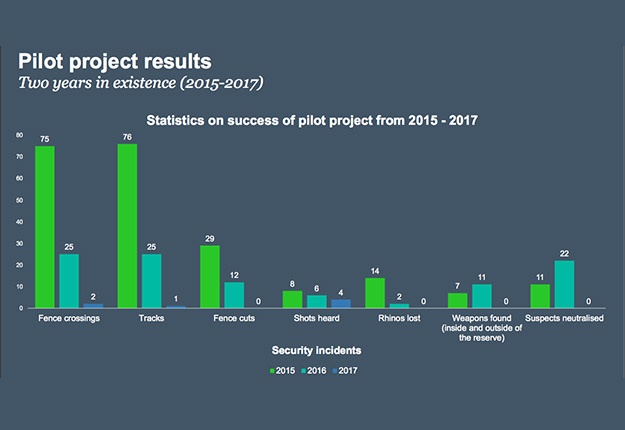WATCH: New hi-tech project halts rhino poaching in private reserve
11 May, 01:25 PM
The moment shots are heard, rangers know it's too late. By the time they arrive on the scene, the rhino is either dead or the horn already hacked off.
This is the reality for many game reserves across South Africa as the country struggles to contain a poaching epidemic.
In 2017 the Department of Environmental Affairs released statistics showing that 1 215 rhinos were poached across the country in 2014. Since then the continuous demand for rhino horn in the Far East has continued to fuel poaching. The horn is used in traditional medicine to treat various illnesses such as gout, food poisoning and even a simple hangover.
But a new innovative, multi-pronged technical solution has turned the tables on poachers. International technology companies Dimension Data and Cisco have partnered on a project called Connected Conservation to implement a state-of-the-art alarm and tracking system to keep poachers out and keep rhinos safe.
The pilot project at a 62 000-hectare game reserve near the Kruger National Park has led to a drastic decline in poaching.
Since taking technology to the bush in November 2015, Connected Conservation reduced poaching in the reserve to zero in 2017.
"Their previous means of security was a brick-walled unit, under lock and key, where they would monitor rhino poaching in the bush," says Bruce "Doc" Watson, Dimension Data's group executive for Cisco Alliance.
The Connected Conservation project was a serious step up. Phase one saw the implementation of CCTV cameras and fingerprint scanning at all gates to monitor visitors, staff, contractors as well as land owners. The installation of Cisco Wi-Fi and LAN internet at every entrance has aided rangers by providing better communication across the entire interior of the reserve. A 72km electric fence built to prevent incursions, 24-hour patrols and a cloud system for backing up information for analysis have all helped prevent rhino poaching at the reserve.
Two years into its existence Connected Conservation has made a drastic impact on incursions into the reserve. Since its launch in 2015, trespassing has been reduced by 68%. The pilot project's statistics show that in 2015 the reserve experienced 75 fence crossings, but by 2017 that number was reduced to just two. Effective communication as a result of access to Wi-Fi on site has reduced reaction time from 30 to seven minutes.
Eyes and ears on the ground
"What we have developed is a proactive solution," explains Watson.
He explained that the method of using dye to deter poachers or installing sensors in the horn and the subcutaneous layer on the rump are reactive responses.
"The problem with that is when you find the rhino and the sensors start speaking to each other, the rhino is already dead. Protecting the land to ensure the animal can roam freely is proactive".
Phase two of the project is now in place and will see the installation of various sensors around the perimeter by the end of June 2018.
"What we have been doing is testing various sensors that can track movement in and out of the reserve. We are now able to use thermal imaging, magnetic sensors as well as acoustic fibre to alert us of any incursions," says reserve warden David Powrie. Acoustic fibre is an underground audio sensor system that alerts rangers of any movement along the electrified fence.
Sensors will also be placed on vehicles entering the reserve to keep track of their activity while on site. In addition, the reserve will also be installing Semtech's LoRa wireless technology to assist with analysing sensors placed on vehicles and improving communication within the reserve.
"We have got proven success," says Dimension Data's Middle East and Africa CEO Grant Bodley.
"This project is not intrusive, nor is it invasive. The animal is not affected as we are protecting its perimeters."
Due to its success this anti-poaching project will be expanding to other parts of the African continent. It is already underway in Zambia. Connected Conservation will then move to Kenya and Mozambique to combat both rhino and elephant poaching. Future goals include protecting endangered species such as pangolin, tigers in India and Asia, as well as marine life.
"More than ever before, technology has given us the ability to change the world – not tomorrow, not someday, but now," says Cisco's senior-vice president and chief marketing officer Karen Walker.













































